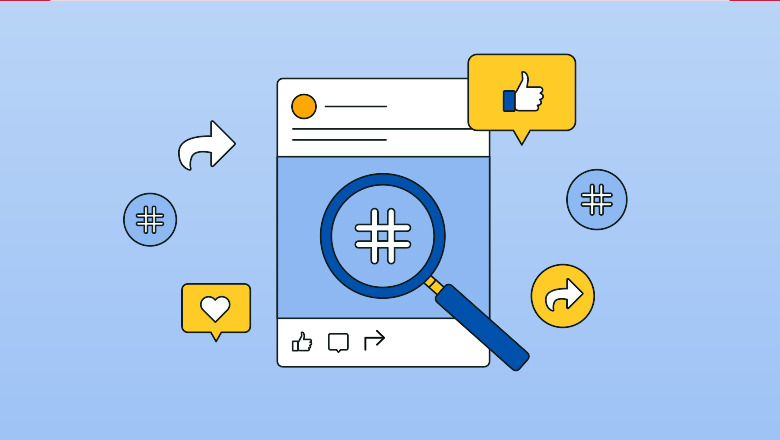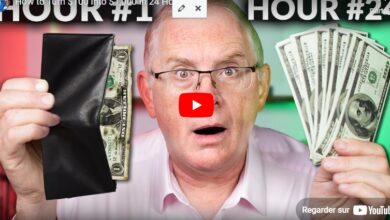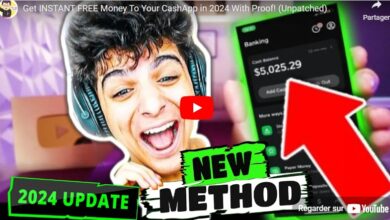How hashtags on Facebook still work for businesses in 2024
Organic visibility on Facebook has taken a hit in the past few years. But strategic hashtagging helps you address this challenge. Hashtags on Facebook help you categorize your content and make it easier for users to find your posts. While they may not be as popular as they are on other platforms, they’re still very effective if you use them correctly.
In this post, we take a deep dive into the world of Facebook hashtags. We show you how to use hashtags on Facebook and how your business can benefit from them. As a bonus, we even share a list of the most popular Facebook hashtags in 2024. Let’s get started.
- What are Facebook hashtags?
- Do hashtags on Facebook work?
- How to use hashtags on Facebook?
- Benefits of using Facebook hashtags
- Top Facebook hashtags in 2024
- 30 popular hashtags on Facebook
- Top 10 Facebook hashtags for B2B
- Top 10 hashtags for fashion and beauty
- Top 10 Facebook hashtags for fitness
- Top 10 Facebook hashtags for food, beverage and restaurant
- Top 10 Facebook hashtags for technology and software
- Top 10 Facebook hashtags for travel
- The importance of hashtag analytics
- How are you using hashtags on Facebook?
What are Facebook hashtags?
Facebook hashtags are clickable links created by adding the # symbol to words and phrases and added to your Facebook posts. If someone clicks on a certain Facebook hashtag or searches for it, they’ll see more posts containing the hashtag. This helps them to learn more about the topic and discover more content related to it.
Do hashtags on Facebook work?
The short answer is: Yes.
Hashtags on Facebook turn into clickable links to categorize conversations on the platform. A search for #NFL will bring up Facebook posts related to the NFL. This allows people to keep up with conversations related to the league such as game commentary, predictions and more. But keep in mind that only the posts that use this hashtag will show up in this search.

That means just posting about the topic isn’t enough to reach people who aren’t following your Page. You need to use a relevant hashtag to ensure that non-followers can discover your post and engage with it.
Following the same #NFL example, FanDuel shared a throwback video from a 2015 NFL game. The video included the #NFL hashtag along with several other relevant hashtags to bring more visibility. Naturally, it garnered tons of engagement including 900+ comments and 600+ shares.

To see how well Facebook hashtags work for you, consider running a social media experiment. Create two similar posts with and without the hashtag and publish them when your audience is most engaged. Then see the magic happen.
How to use hashtags on Facebook
Before you start adding hashtags to your Facebook posts, it pays to know how to use them more strategically. How many should you use and in what context? How do you format them?
Let’s check out some best practices and tips on how to use hashtags on Facebook.
1. Avoid spaces in multi-word hashtags
To create a hashtag from a single word, you only need to add the # symbol to the front. For multi-word phrases, you need to join all the words, so they become a single clickable link.
Adding spaces between the words will break up the hashtag, making only the first word clickable. That means your post is unlikely to show up in front of relevant users.
If you’re worried about readability, capitalize the first letter of each new word to make it easier to read. So #tacotuesday becomes #TacoTuesday.
2. Avoid all punctuations and symbols
While you can add numbers to your hashtags, skip unique characters such as symbols and punctuations. Adding these will render your hashtag useless and will not make the hashtag produce a single clickable link. That means if you want to share a hashtag containing “%,” you’ll have to spell it out as “percent.”
3. Use hashtags to categorize conversations and topics
You can technically use hashtags randomly across your Facebook posts. But if you want to get more out of your Facebook hashtags, you need to use them purposefully. Think of separate hashtag campaigns for different goals such as brand awareness, event promotion and so on.
Use hashtags to categorize conversations and topics and make it easier for users to find relevant posts. So when someone clicks on a hashtag on #BrandNameTips, they’ll discover tips related to your brand. Similarly, your brand can discover user-submitted content with a designated hashtag.
For instance, Fabletics influencers have to use the hashtag #FableticsPartner. This helps the brand categorize influencer-created posts and makes it easier to find content to repost.

4. Join trending topics and conversations
From sporting events such as the World Cup to #NationalDonutDay, hashtags are totally fair game for topical content. As long as you’re posting tasteful and relevant content related to an event, you may very well score some extra attention to your post by tacking on a tag.
For example, THB Bagelry & Deli shared a post promoting #NationalBagelDay to engage their local audience for a BOGO deal that was part of a campaign to use National Bagel Day to donate a portion of their sales to a good cause.

Keep in mind that the hashtag doesn’t necessarily have to be directly relevant to your business. Look for hashtags around topics and conversations that are trending at the moment. What are events or incidents that everyone’s talking about? Which hashtags are they using for these discussions?
5. Incorporate hashtags into sentences
Use Facebook hashtags naturally in your sentences whenever possible. This helps you avoid having to repeat two versions of the same word: one hashtagged and one not. And it makes your post look less spammy.
For example:
Get a chance to win a #GoProHero12
Is much cleaner and simpler than:
Get a chance to win a GoPro Hero 12. #GoProHero12
Here’s how GoPro uses the hashtag naturally in a sentence.

6. Use Facebook hashtags within reason
On a related note, be mindful of how many hashtags you add to your posts. Too many and your post will come across as messy and spammy.
SocialPilot recommends using two to three hashtags in your Facebook post.
If you want to add more, put most of them at the end of your caption instead of hashtagging every other word in a sentence. Definitely #dont #do #this in the main caption area.
Experiment with different hashtag volumes to see what works best for you. This is why it pays to keep a close eye on your social media analytics.
Hulu keeps it simple by only hashtagging the name of the show and nothing more.

Benefits of using Facebook hashtags
Many brands don’t see the need to use hashtags on Facebook. But here are some reasons why you shouldn’t ignore them.
1. Increase brand exposure
Facebook hashtags are a nice touch from a search perspective, allowing you to get more eyes on your brand’s posts. This translates to increased brand exposure, which is crucial for boosting brand awareness.
Dumpling Town uses the hashtag #StatenIslandFood in its Facebook posts. When someone searches for the hashtag, the restaurant’s posts show up in the results. This helps get the business in front of more people, adding to its brand exposure.

2. Encourage audience interaction
The more people see your posts, the more likely you are to boost your engagement. That’s why hashtags positively contribute to your Facebook engagement rates.
In addition to boosting your post visibility, hashtags become links that people can click to learn more about the topic. Adding them to your posts helps you create opportunities for people to interact with your content.
3. Source questions and feedback
Since hashtags help you categorize topics and conversations, use them to organize questions and feedback. Create hashtags dedicated to this purpose and encourage your audience to use them to share their queries and feedback.
That way, you can easily find all the questions and comments people have for your business under a dedicated hashtag. This will help support your customer service efforts and guide your content ideation development.
You can even track hashtags related to your industry to look for questions and complaints not specific to your brand.
4. Create an omnichannel experience
Hashtags are vital for your omnichannel strategy. They help tie your social media posts together across multiple platforms. So you get to create a consistent omnichannel experience.
This makes it easier for your audience to engage with the campaign no matter which platform they’re using. It even improves the chances of people remembering your campaign because they’re seeing the hashtag everywhere.
Take, for example, the #DMsChallenge campaign that Dr. Martens launched not just on Facebook:

But also on X (formerly Twitter):

And Instagram:

Top Facebook hashtags in 2024
Earlier, we advised that you use hashtags to jump in on trending topics and conversations. But now the challenge is about “how to find the trending hashtags on Facebook.” To give you a head start, we share a list of trending Facebook hashtags at the time of writing.
30 popular hashtags on Facebook
- #trending – 875 million
- #love – 743 million
- #photography – 227 million
- #tbt – 210 million
- #music – 170 million
- #photooftheday – 159 million
- #dance – 147 million
- #viralvideo – 141 million
- #motivation – 134 million
- #luxury – 80 million
- #shopping – 72 million
- #inspiration – 66 million
- #funnyvideos – 66 million
- #dancechallenge – 60 million
- #nofilter – 59 million
- #photographer – 55 million
- #sunset – 52 million
- #football – 46 million
- #success – 42 million
- #photographychallenge – 42 million
- #challenge – 34 million
- #dogs – 34 million
- #night – 34 million
- #sky – 32 million
- #sports – 30 million
- #cats – 27 million
- #giveaway – 25 million
- #motivationalquotes – 20 million
- #mondaymotivation – 16 million
- #vibes – 15 million
Top 10 Facebook hashtags for B2B
- #entrepreneur – 43 million
- #digitalmarketing – 32 million
- #startup – 15 million
- #leadership – 15 million
- #contentmarketing – 6.1 million
- #growthmindset – 5.3 million
- #marketingtips – 4.4 million
- #businessgrowth – 4.4 million
- #businesstips – 3.8 million
- #b2b – 3.7 million
Top 10 Facebook hashtags for fashion and beauty
- #fashion – 359 million
- #beauty – 183 million
- #style – 174 million
- #skincare – 91 million
- #ootd – 84 million
- #fashionista – 34 million
- #skincareroutine – 18 million
- #skincaretips – 8.7 million
- #skincareproducts – 8.3 million
- #beautytips – 7.6 million
Top 10 Facebook hashtags for fitness
- #fitness – 196 million
- #workout – 66 million
- #fitnessmotivation – 43 million
- #gymlife – 23 million
- #gymmotivation – 16 million
- #fitnessmodel – 16 million
- #fitnessgoals – 5.7 million
- #healthandwellness – 5 million
- #fitnesslifestyle – 4.5 million
- #fitspiration – 2.9 million
Top 10 Facebook hashtags for food, beverage and restaurant
- #food – 170 million
- #foodie – 81 million
- #pizza – 48 million
- #healthyfood – 39 million
- #restaurant – 32 million
- #foodlover – 31 million
- #bar – 22 million
- #fooddelivery – 8 million
- #homecooking – 7.3 million
- #foodtruck – 5.6 million
Top 10 Facebook hashtags for technology and software
- #technology – 47 million
- #chatGPT – 13 million
- #gadgets – 9.7 million
- #artificialintelligence – 4.4 million
- #machinelearning – 3.5 million
- #technews – 3.4 million
- #softwaredevelopment – 1.4 million
- #AItools – 255k
- #techtalk – 131k
- #softwareupdate – 56k
Top 10 Facebook hashtags for travel
- #travel – 174 million
- #vacation – 38 million
- #travelphotography – 33 million
- #wanderlust – 18 million
- #tourism – 15 million
- #traveltheworld – 7.6 million
- #adventuretravel – 3.3 million
- #solotravel – 1.9 million
- #travelpics – 1.1 million
- #goexplore – 658k
The importance of hashtag analytics
If you’re not analyzing hashtags, how do you know which hashtags to use? Or whether your hashtag strategy is working?
Hashtag analytics provide you with important metrics on hashtag usage and performance. This helps you track which hashtags are popularly used in your industry, how popular they are and much more.
Understanding these and other Facebook analytics can give you the data you need to pivot or improve your campaigns for optimal engagement. Tracking your post reach and engagement can give you enough insight to understand what resonates with your audiences.
Use these insights to inform your strategy and optimize to boost your Facebook visibility and engagement.
Get more out of your Facebook hashtags
Although not the be-all, end-all of your Facebook presence, hashtags still have their time and place on the platform.
That doesn’t mean you have to add hashtags to every single Facebook post. The trick is to find the right balance between different content types and know which ones should have a hashtag.
Check out our interactive tool to find the right social media content mix for your brand.
The post How hashtags on Facebook still work for businesses in 2024 appeared first on Sprout Social.






